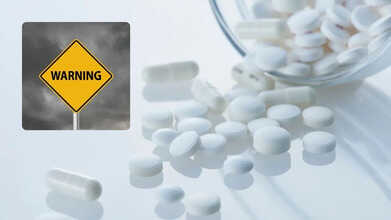- Health Conditions A-Z
- Health & Wellness
- Nutrition
- Fitness
- Health News
- Ayurveda
- Videos
- Medicine A-Z
- Parenting
- Web Stories
Delhi’s Air Quality Slips Back to ‘Very Poor’; Toxic Air Could Cause Acute Health Effects, Warns AIIMS Doctor

Credits: Canva
Delhi witnessed a slight improvement in its Air Quality Index (AQI) for a couple of days before it again slipped back to 'very poor' category. On Sunday morning, some areas in fact reached 'severe' category on the AQI.
While pollution spiked during Diwali, on Friday and Saturday, Delhi's AQI was recorded at 275 and 292 respectively, which has placed the air quality category in 'poor'.
However, on Sunday morning, Delhiites woke up to 'very poor' air quality, thanks to the thick layer of smog. The AQI was recorded well above 300 in most areas. Visuals too show low visibility in many areas of the national capital.
What Does The Expert Say About The Air Quality?
On Sunday, as of 7am, Delhi's Anand Vihar area recorded an AQI of 430, which has placed it under the 'severe' category. Wazirpur also recorded an AQI of 403, further placing it under the 'severe' category. Speaking to ANI, former AIIMS Director Dr Randeep Guleria urged people to use preventative measures in order to minimize their exposure to the polluted air. He also warned people of the health implications which could be the result of deteriorating air quality.
"The current high levels of air pollution, indicated by poor AQI, are leading to acute health effects, particularly among individuals with underlying heart or lung conditions, the elderly, and young children. These groups are experiencing increased chest discomfort, breathing difficulty, cough, and worsening of pre-existing conditions like asthma and COPD," Dr Guleria told ANI, on Friday.
"Even healthy individuals are reporting symptoms such as nasal stuffiness, throat pain, chest tightness, and coughing. The inflammation and narrowing of airways caused by pollutants are contributing to these issues. Additionally, the use of crackers, despite permissions for 'green crackers,' has exacerbated air pollution," he added.
What Preventative Measures Should One Use?
The best way to protect yourself is by limiting your outdoor timings, especially during the early morning hours and at the night. Smog is at its lowest during the afternoon. Furthermore, using an N-95 respirator could protect you from the minute pollutant particles in the air.
N-95 is a respiratory protective device designed to achieve a very close facial fit and very efficient filtration of airborne particles, notes the FDA. This is what makes it fit for use during high levels of pollution.
The edges of N-95 are designed to form a seal around the nose and mouth. Some models even have exhalation valves that can make breathing out easier and help reduce the heat build-up.
As per a 2021 study published in the Indian Journal of Radiology and Imaging, the N-95 mask could block "at least 95% of very small test particles".
Read More: Which Mask To Wear For Best Protection?
What Does AQI Mean?
As per the Central Pollution Control Board, here's how the data on AQI can be interpreted
- 0-50 is considered ‘good’
- 51-100 is considered ‘satisfactory’
- 101-200 is considered ‘moderate’
- 201-300 is considered ‘poor’
- 301-400 is considered ‘very poor’
- 401-500 is considered ‘severe’
Delhi AQI as of 7am
Alipur, Delhi (DPCC) - 309.00
Anand Vihar, Delhi (DPCC) - 430.00
Ashok Vihar, Delhi (DPCC) - 369.00
Aya Nagar, Delhi (IMD) - 272.00
Bawana, Delhi (DPCC) - 390.00
Burari Crossing, Delhi (IMD) - 344.00
CRRI Mathura Road, Delhi (IMD) - 330.00
Chandni Chowk, Delhi (IITM) - 376.00
DTU, Delhi (CPCB) - 266.00
Dr. Karni Singh Shooting Range, Delhi (DPCC) - 317.00
Dwarka-Sector 8, Delhi (DPCC) - 301.00
IGI Airport (T3), Delhi (IMD) - 269.00
IHBAS, Dilshad Garden, Delhi (CPCB) - 310.00
ITO, Delhi (CPCB) - 329.00
Jahangirpuri, Delhi (DPCC) - 370.00
Jawaharlal Nehru Stadium, Delhi (DPCC) - 304.00
Popular Cholesterol Drug Recalled For Failing 'Dissolution Specifications', What Does This Mean?

Credits: Canva
Over 141,000 bottles of popular cholesterol medication, Atorvastatin Calcium Tablets, have been recalled as it "failed dissolution specifications". This means the drugs did not pass a solubility test or failed to dissolve at the standard rate.
As per the report by the US Food and Drug Administration (FDA), Ascend Laboratories, LLC, which is a New Jersey-based pharmaceutical company was the first to recall the use of the tablets on September 19, 2025.
Following that, this month the drugs have been recalled under Class II recall, which means that the product may cause temporary or medically reversible adverse health consequences or where the probability of serious adverse health consequences is remote, notes the FDA.
Which Medicines Have Been Recalled?
The current recall only affects the bottles of 10mg, 20mg, 40mg, and 80mg of the said drugs, manufactured by Alkem Laboratories, Ltd. of India. The drugs were distributed by Ascend. The recalled bottles contained tablets which ranged from 90-count to 1000-count bottles.
The FDA is urging people to speak to a doctor or pharmacist before stopping their cholesterol medicine, or switching to any alternatives. The FDA explains, "consumers can generally continue taking the medicine unless the recalling company provides other instructions. In some instances, stopping your medicine may be more harmful to your health than continuing to take the recalled medicine."
What Is A Dissolution Test?
This test is conducted to determine the compliance of the drug with the dissolution requirements for dosage forms to be administrated orally.
Dissolution specifications are quality control limits for drug products that define the acceptable amount of drug substance that must dissolve in a specified time under laboratory conditions. The test also ensures batch-to-batch consistency and predicts how a drug will be released in the body, providing a surrogate measure of clinical performance.
The specifications are based on data from batches, which are used in clinical trials and are then guided by the drug's properties and the dosage form. They vary depending on the drug release types, which could be categorized under three kinds:
- Immediate Release (IR)
- Extended Release (ER)
- Delayed Release (DR)
What Does FDA Say About This Recall?
As per the FDA, Class I recalls are the most serious, this is where there is a reasonable probability that using or being exposed to the recalled drug could cause serious health consequences to the customer. This recall involves removing the drug from the market and are conducted at consumer level.
Class II recall however could cause temporary health consequences but the probability of health issue is remove. FDA notes that "these recalls are generally conducted at the retail level, and patients and consumers can continue using the medicine unless otherwise directed by the recalling company or FDA."
FDA says that for class II or class III recalls, consumers may "generally continue taking the medicine unless the recalling company provides other instructions".
Katee Shackoff Says Losing Weight Stopped Her Period, Know The Science Behind This

Credits: Wikimedia Commons
Katee Shackoff, American actress, best known for playing Lieutenant Kara "Starbuck" Thrace on Battlestar Galactica, opened up about her journey of body transformation and how it has negatively impacted her and made her menstruation stop completely. She said that she may have taken the process of body transformation too far in her work.
In a conversation on the Joe Rogan Experience, she said that she wanted to change her physical appearance to more precisely embody a character. She noted that for a Netflix show Another Life, which ran from 2019 to 2021, she underwent a weight loss journey as her character required her to look gaunt and dehydrated in the initial scenes. She said that she "grinded" to put on muscles, and got lean and fit, and also changed her intake to 1,500 calories a day.
While the trick worked for her weight loss, it caused her to completely stop her menstruation. This is when she knew she went too far, and she was in fact, happy to put the weight back, and as her character also progressed to do so.
Can Weight Loss Impact Menstruation?
Cleveland Clinic mentions that severe weight loss can actually cause amenorrhea, a condition where your period stops.
Endocrinologist, Vinni Makin, MD, tells Cleveland Clinic that if your period has stopped, it could be because you are exercising too much, eating too little, or both.
Dr Makin says, "When we are talking about weight loss, if a person is trying to lose weight even though they are at a healthy weight already...this can impact the menstrual cycle by making the periods irregular or by stopping the menstrual cycle altogether."
Why Does Losing Weight Stops Your Period?
The doctor suggests that it is because your body undergoes stress from the physical changes, which may not necessarily be required. She explains that this puts your body in a 'fight or flight' mode. "Your body is conserving all its energy. It stops your menstrual cycle and reduces your hormone production because it only wants to use resources for things that are very, very, very important, like breathing and digesting."
While not all exercise disrupts menstrual cycle, studies have shown that exercising vigorously may have an impact on menstruation.
A 2007 study published in BMJ, titled Exercise and Menstrual Function, saw that 80% of women who exercise vigorously may experience some form of menstrual dysfunction. Another 1983 study, published in the American Journal of Industrial Medicine, found that women who run more than 50 miles a week are much more likely to experience amenorrhea.
However, it does not mean that not having your period means you are more athletic than other people. The doctor explains, "When somebody loses their period because of exercise or diet issues, that does not mean they are physically fit. That is a sign that they are nutritionally deficient. They don't have enough fat to support that hormones production."
Could You Get Your Period Back?
While losing your period could be scary, you can get your period back by making certain lifestyle changes.
"You need to decrease exercise and increase your caloric intake," says Dr Makin. The doctor says that the rule of thumb is that you should be striving to return to your weight you were when your cycle was arriving every month at the expected time.
NHS Issues ‘Burning Stomach’ Warning Over THIS Common Painkiller

Credits: Canva
Individuals using one of the UK’s most frequently prescribed painkillers should know about a rare side effect that can cause a severe burning sensation in the stomach. While this medication is widely used and taken regularly by many, health experts have now issued a warning regarding this potential reaction.
‘Burning Stomach’ Warning Over This Common Painkiller
Naproxen is a non-steroidal anti-inflammatory drug (NSAID), part of the same group as ibuprofen and aspirin. It helps reduce pain, inflammation, and swelling in muscles and joints. Doctors may prescribe it in tablet or liquid form for conditions like rheumatoid arthritis, osteoarthritis, gout, and menstrual cramps.
It’s also used to treat certain muscle or bone problems, including back pain, sprains, and strains. The duration of treatment can vary, some people only need a few days, while others may require longer-term prescriptions. If you take naproxen for an extended period, your doctor may also prescribe medication to reduce the risk of side effects.
According to the NHS, your naproxen dose depends on why you are taking it, your age, liver and kidney function, and how well it relieves your symptoms. Older adults and people with heart, liver, or kidney issues usually receive lower doses. For children, the dose is calculated based on weight.
Naproxen Side Effects
Like all medications, naproxen can cause side effects, though not everyone experiences them. Common issues, affecting about 1 in 100 people, include:
- Confusion
- Headache
- Ringing in the ears
- Vision changes
- Drowsiness or fatigue
- Dizziness
- Skin rashes
If any side effect persists or causes discomfort, speak with a doctor or pharmacist. In rare cases, naproxen can lead to severe stomach problems, such as intense indigestion, heartburn, or abdominal pain, which may indicate an ulcer or inflammation, according to the NHS.
Naproxen: NHS Issues Warning Over Naproxen
The NHS website claims: "Your doctor may tell you not to take naproxen if you have a stomach ulcer or you have had one in the past. If you need to take naproxen but are at risk of getting a stomach ulcer, your doctor may prescribe another medicine for you to take alongside naproxen to protect your stomach.”
The most common symptom of a stomach ulcer is a burning or gnawing pain in the centre of the stomach. But stomach ulcers are not always painful and some people may have other symptoms, such as indigestion, heartburn and feeling sick.
If you think you may have symptoms of a stomach ulcer, stop taking naproxen and contact your doctor. You can report any suspected side effect using the Yellow Card safety scheme.
© 2024 Bennett, Coleman & Company Limited

